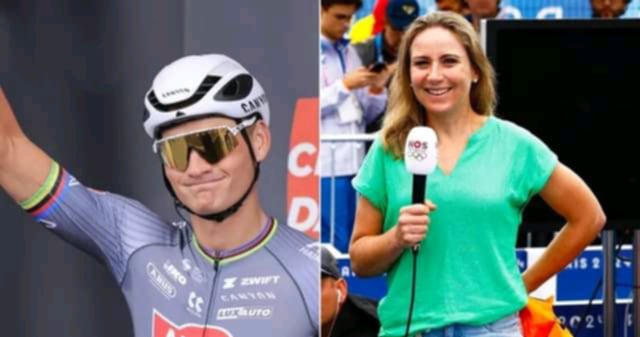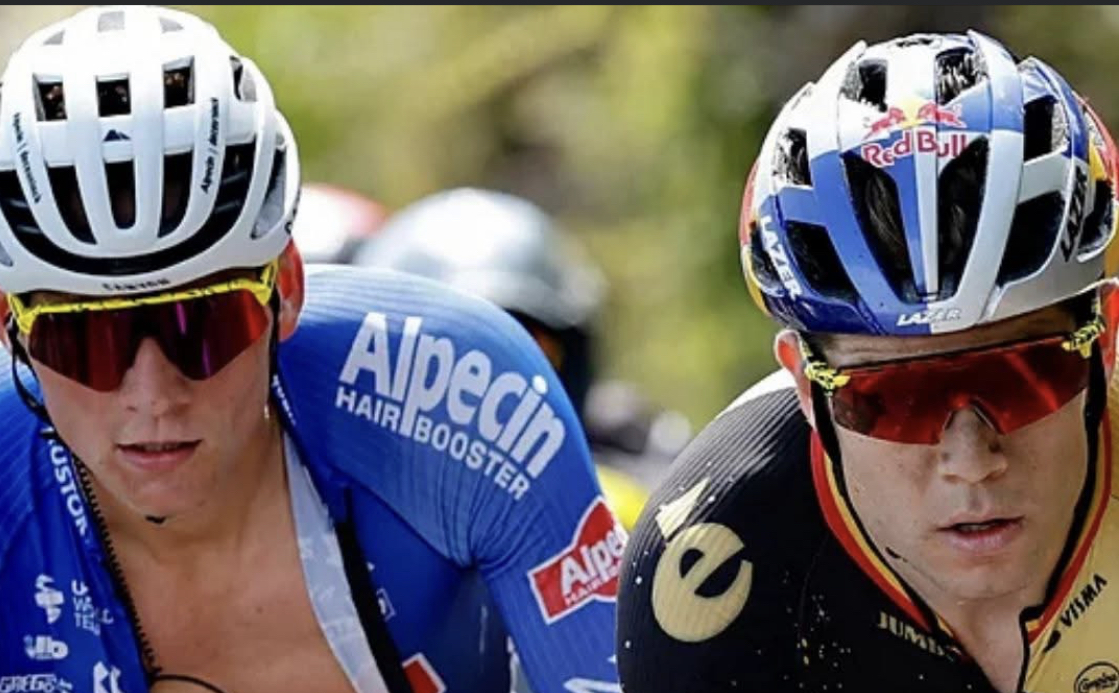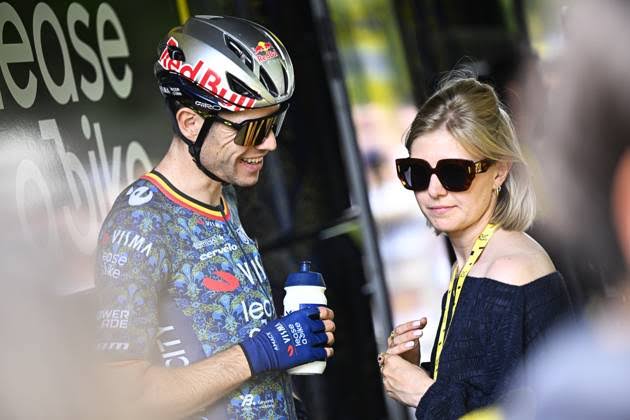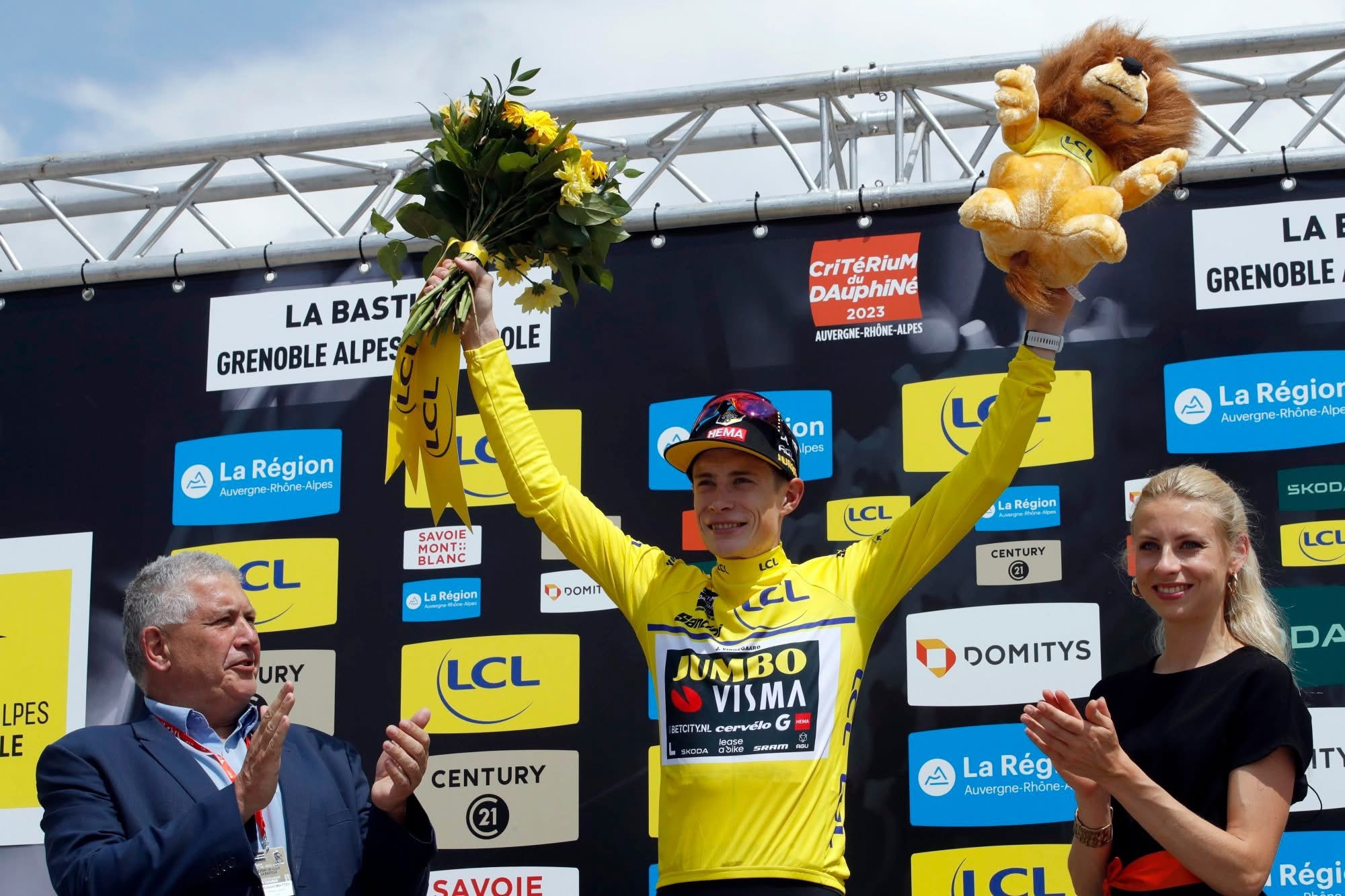**”He is disrespectful”: Annemiek van Vleuten Lashes Out at Mathieu van der Poel**
In the competitive world of professional cycling, rivalries and tensions are often part of the sport’s fabric. However, recent remarks by Dutch cycling legend Annemiek van Vleuten have sent shockwaves through the cycling community. Van Vleuten, known for her poise and dedication, publicly criticized her compatriot Mathieu van der Poel, calling his recent behavior “disrespectful.” This statement has sparked widespread debate, raising questions about sportsmanship, professionalism, and the evolving dynamics within Dutch cycling.

Context of the Incident
The controversy centers around an incident during the recent cycling season which involved Van der Poel and Van Vleuten. While both athletes are celebrated for their exceptional talent and achievements, their interaction during a key race drew attention. According to several witnesses and race footage, Van der Poel’s actions on the course appeared to be dismissive and lacked the sportsmanship expected at the highest level of competition.
Specifically, Van der Poel was accused of ignoring Van Vleuten’s attempts to communicate during a crucial part of the race, and there were moments where he was perceived to have made gestures or moved in ways that suggested disregard for her presence on the road. Though Van der Poel later issued an apology, the incident left a bitter taste and was seen by many as a sign of deeper issues.
### Van Vleuten’s Bold Criticism
In a recent interview, Annemiek van Vleuten did not hold back. When asked about her views on Van der Poel’s conduct, she responded with candor and a hint of frustration:
*”I think what Mathieu did was disrespectful. Cycling is about respect — respect for your opponents, for the sport, and for the fans. What I saw was not just a mistake on the road, but a lack of regard for the others who are competing just as hard. That kind of behavior doesn’t belong in our sport.”*
Her words resonated strongly within the cycling community, many of whom admire her integrity and leadership. Van Vleuten’s outburst was not only a critique of a single incident but also a broader statement about the values that should underpin competitive cycling.
### The Nature of the Disrespect
Van Vleuten’s critique points to specific behaviors that she considers disrespectful. These include:
– **Ignoring communication:** During the race, Van der Poel was perceived to dismiss Van Vleuten’s attempts to coordinate or signal, which could have been crucial for team strategy or safety.
– **Gestures and body language:** Witnesses noted that Van der Poel’s gestures, such as dismissive hand movements or aggressive riding style, appeared to undermine the spirit of camaraderie and sportsmanship.
– **Public perception and media comments:** Beyond the race itself, Van der Poel’s comments in interviews and social media posts following the incident were seen by some as dismissive or dismissive of Van Vleuten’s efforts and achievements.
Van Vleuten emphasized that such behaviors can erode trust and respect among competitors, which are essential for the integrity of the sport.
### Reactions from the Cycling Community
The public reaction to Van Vleuten’s comments has been swift and divided. Many fans and fellow athletes have expressed support for her stance, praising her for standing up against unsportsmanlike conduct. Former champions and current professionals echoed her sentiments, emphasizing the importance of respect and professionalism.
For example, former world champion Marianne Vos commented:
*”Annemiek is right. Respect is the foundation of our sport. We compete hard, but always with respect for each other. Mathieu is an amazing athlete, but his actions should reflect the values we uphold.”*
However, some critics argue that Van der Poel’s behavior might have been misinterpreted or taken out of context. They suggest that athletes sometimes display intense emotions or aggressive tactics that are part of high-stakes racing, and that these should not be over-analyzed.
### Van der Poel’s Response
In the aftermath of the controversy, Van der Poel issued a statement through his team, expressing regret over the incident but also defending his actions:
*”I respect all my fellow riders, including Annemiek. Sometimes, in the heat of racing, things happen quickly, and I did not intend to disrespect anyone. I apologize if my actions were perceived that way. I’ve always tried to race with integrity and respect.”*
While his apology was noted, it did little to quell the debate. Many believe that Van der Poel’s reputation as a fierce competitor is well-earned, but that sportsmanship remains vital.
### Broader Implications for Cycling
This incident has sparked a broader conversation about the culture within professional cycling. As the sport evolves with more aggressive tactics, higher stakes, and intense rivalries, maintaining respect among competitors becomes even more critical.
Van Vleuten’s outspoken stance serves as a reminder that athletes, regardless of their achievements, should act as role models and uphold the values of fairness and respect. It also raises questions about how race officials, teams, and governing bodies should address misconduct and promote a positive sporting environment.
### The Role of Media and Social Media
Social media has played a significant role in amplifying this controversy. Fans and commentators have used platforms like Twitter and Instagram to share their opinions, often dividing into supporters of Van Vleuten and defenders of Van der Poel.
Hashtags like #RespectInCycling and #VanVleutenVows have trended, encouraging discussions about sportsmanship. Meanwhile, some fans have criticized what they see as over-sensitivity or unnecessary reactions.
The media coverage has also contributed to shaping public perceptions. Some outlets have highlighted Van Vleuten’s long-standing reputation for professionalism, while others have focused on Van der Poel’s fiery persona.
### Looking Ahead: Reconciliation or Further Tensions?
Whether this controversy will lead to a reconciliation or deepen the divide remains to be seen. Both athletes are highly respected within the sport, and many hope that they can resolve any misunderstandings and continue to compete at the highest level with mutual respect.
Teams and cycling authorities have called for calm and constructive dialogue. Van der Poel’s team has indicated that they will address the matter internally, emphasizing education on sportsmanship and respect.
### Conclusion
The clash between Annemiek van Vleuten and Mathieu van der Poel underscores the importance of sportsmanship in professional cycling. Van Vleuten’s candid criticism highlights how personal conduct can impact the reputation of athletes and the integrity of the sport.
While competition will always bring out fierce rivalries and intense moments, maintaining respect and professionalism should remain paramount. As the cycling world reflects on this incident, it serves as a reminder that beyond medals and records, sports are about demonstrating character, humility, and respect for fellow competitors.
The hope is that this controversy will inspire a renewed focus on values that unite cyclists and fans alike, fostering an environment where excellence and sportsmanship go hand in hand.
**
In the competitive world of professional cycling, rivalries and tensions are often part of the sport’s fabric. However, recent remarks by Dutch cycling legend Annemiek van Vleuten have sent shockwaves through the cycling community. Van Vleuten, known for her poise and dedication, publicly criticized her compatriot Mathieu van der Poel, calling his recent behavior “disrespectful.” This statement has sparked widespread debate, raising questions about sportsmanship, professionalism, and the evolving dynamics within Dutch cycling.
Context of the Incident
The controversy centers around an incident during the recent cycling season which involved Van der Poel and Van Vleuten. While both athletes are celebrated for their exceptional talent and achievements, their interaction during a key race drew attention. According to several witnesses and race footage, Van der Poel’s actions on the course appeared to be dismissive and lacked the sportsmanship expected at the highest level of competition.
Specifically, Van der Poel was accused of ignoring Van Vleuten’s attempts to communicate during a crucial part of the race, and there were moments where he was perceived to have made gestures or moved in ways that suggested disregard for her presence on the road. Though Van der Poel later issued an apology, the incident left a bitter taste and was seen by many as a sign of deeper issues.
Van Vleuten’s Bold Criticism
In a recent interview, Annemiek van Vleuten did not hold back. When asked about her views on Van der Poel’s conduct, she responded with candor and a hint of frustration:
*”I think what Mathieu did was disrespectful. Cycling is about respect — respect for your opponents, for the sport, and for the fans. What I saw was not just a mistake on the road, but a lack of regard for the others who are competing just as hard. That kind of behavior doesn’t belong in our sport.”*
Her words resonated strongly within the cycling community, many of whom admire her integrity and leadership. Van Vleuten’s outburst was not only a critique of a single incident but also a broader statement about the values that should underpin competitive cycling.
The Nature of the Disrespect
Van Vleuten’s critique points to specific behaviors that she considers disrespectful. These include:
– **Ignoring communication:** During the race, Van der Poel was perceived to dismiss Van Vleuten’s attempts to coordinate or signal, which could have been crucial for team strategy or safety.
– **Gestures and body language:** Witnesses noted that Van der Poel’s gestures, such as dismissive hand movements or aggressive riding style, appeared to undermine the spirit of camaraderie and sportsmanship.
– **Public perception and media comments:** Beyond the race itself, Van der Poel’s comments in interviews and social media posts following the incident were seen by some as dismissive or dismissive of Van Vleuten’s efforts and achievements.
Van Vleuten emphasized that such behaviors can erode trust and respect among competitors, which are essential for the integrity of the sport.
Reactions from the Cycling Community
The public reaction to Van Vleuten’s comments has been swift and divided. Many fans and fellow athletes have expressed support for her stance, praising her for standing up against unsportsmanlike conduct. Former champions and current professionals echoed her sentiments, emphasizing the importance of respect and professionalism.
For example, former world champion Marianne Vos commented:
*”Annemiek is right. Respect is the foundation of our sport. We compete hard, but always with respect for each other. Mathieu is an amazing athlete, but his actions should reflect the values we uphold.”*
However, some critics argue that Van der Poel’s behavior might have been misinterpreted or taken out of context. They suggest that athletes sometimes display intense emotions or aggressive tactics that are part of high-stakes racing, and that these should not be over-analyzed.
Van der Poel’s Response
In the aftermath of the controversy, Van der Poel issued a statement through his team, expressing regret over the incident but also defending his actions:
*”I respect all my fellow riders, including Annemiek. Sometimes, in the heat of racing, things happen quickly, and I did not intend to disrespect anyone. I apologize if my actions were perceived that way. I’ve always tried to race with integrity and respect.”*
While his apology was noted, it did little to quell the debate. Many believe that Van der Poel’s reputation as a fierce competitor is well-earned, but that sportsmanship remains vital.
Broader Implications for Cycling
This incident has sparked a broader conversation about the culture within professional cycling. As the sport evolves with more aggressive tactics, higher stakes, and intense rivalries, maintaining respect among competitors becomes even more critical.
Van Vleuten’s outspoken stance serves as a reminder that athletes, regardless of their achievements, should act as role models and uphold the values of fairness and respect. It also raises questions about how race officials, teams, and governing bodies should address misconduct and promote a positive sporting environment.
The Role of Media and Social Media
Social media has played a significant role in amplifying this controversy. Fans and commentators have used platforms like Twitter and Instagram to share their opinions, often dividing into supporters of Van Vleuten and defenders of Van der Poel.
Hashtags like #RespectInCycling and #VanVleutenVows have trended, encouraging discussions about sportsmanship. Meanwhile, some fans have criticized what they see as over-sensitivity or unnecessary reactions.
The media coverage has also contributed to shaping public perceptions. Some outlets have highlighted Van Vleuten’s long-standing reputation for professionalism, while others have focused on Van der Poel’s fiery persona.
Looking Ahead: Reconciliation or Further Tensions?
Whether this controversy will lead to a reconciliation or deepen the divide remains to be seen. Both athletes are highly respected within the sport, and many hope that they can resolve any misunderstandings and continue to compete at the highest level with mutual respect.
Teams and cycling authorities have called for calm and constructive dialogue. Van der Poel’s team has indicated that they will address the matter internally, emphasizing education on sportsmanship and respect.
The clash between Annemiek van Vleuten and Mathieu van der Poel underscores the importance of sportsmanship in professional cycling. Van Vleuten’s candid criticism highlights how personal conduct can impact the reputation of athletes and the integrity of the sport.
While competition will always bring out fierce rivalries and intense moments, maintaining respect and professionalism should remain paramount. As the cycling world reflects on this incident, it serves as a reminder that beyond medals and records, sports are about demonstrating character, humility, and respect for fellow competitors.
The hope is that this controversy will inspire a renewed focus on values that unite cyclists and fans alike, fostering an environment where excellence and sportsmanship go hand in hand.



